Contents
Eggplants are very heat-loving plants, and growing them in the garden, even for the middle lane, is quite problematic, to say nothing of the cold climate. Under such conditions, polycarbonate greenhouses are used by vegetable growers as the only opportunity to grow their favorite vegetables not only in season, but all year round. For the greenhouse, you should choose unpretentious hybrid eggplant varieties, mostly of early ripening.
Nutcracker
Mid-early hybrid with a relatively high yield. A feature of this variety is the regular formation of an ovary, even at the very top of the bush, due to which the eggplant crop can be harvested several times – the average yield is 4-6 kg / 1 plant.
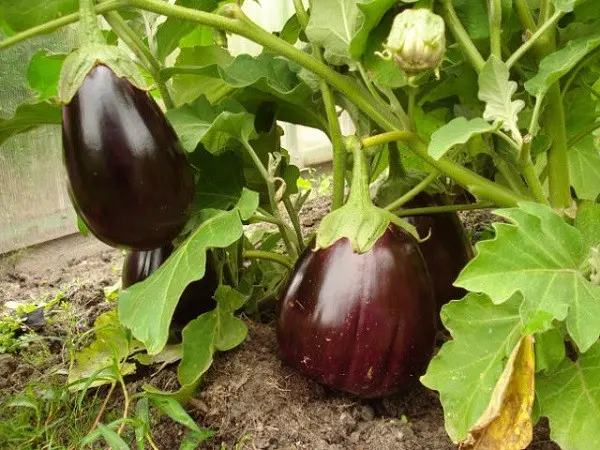
The bushes are slightly spreading, reaching a height of 70-80 cm. The fruits are oval, short (12-15 cm), but wide in diameter, dark purple, one might even say black. The average fruit weight is 250-500 g. The pulp is white, dense, does not contain bitterness. They are perfectly transported, stored for a long time, and at the same time the pulp does not become loose.
The hybrid is intended exclusively for the greenhouse. Fruits about 40 days after transplanting. Seedlings should be transplanted into a greenhouse in early June, but under polycarbonate shelter it is possible earlier. The culture is considered unpretentious, however, regular watering and a constant temperature are required for it. Plant growth can be stimulated by periodic hilling and fertilization.
Video “The best varieties and hybrids of eggplant”
This video shows an overview of some eggplant varieties.
Bagheera
Mid-early hybrid – the ripening period is 100-110 days from the date of sowing seeds for seedlings. A distinctive feature of the variety is its high yield (10-12 kg / 1 sq. m) and simultaneous fruit ripening. The hybrid is quite resistant to diseases, but is demanding of constant temperature and humidity.
The culture was bred specifically for protected ground. In greenhouses, it is customary to grow it using the so-called “low-volume” technology – in separate small containers with a special substrate, which is very convenient in a small greenhouse.
The variety is characterized by a compact bush. The fruits are oval, rather long, widening towards the bottom, intense purple or bluish-black in color, weighing 250-350 g. The fruits are distinguished by good taste and long shelf life. The pulp is dense, slightly greenish. Young fruits are not bitter at all, however, over time, the flesh begins to taste bitter. Suitable for any dishes and preparations.
Purple miracle
The most famous and beloved by vegetable growers hybrid. Such popularity of the variety is due to its versatility and unpretentiousness. The plant feels great and bears fruit, both in greenhouse conditions and in the garden. The culture is resistant to almost all diseases, can tolerate temperature changes, and most interestingly, at any stage of growth, plants are not susceptible to light – they do not need long daylight hours and additional illumination. Thanks to this quality, the Purple Miracle can be grown in the northern regions.
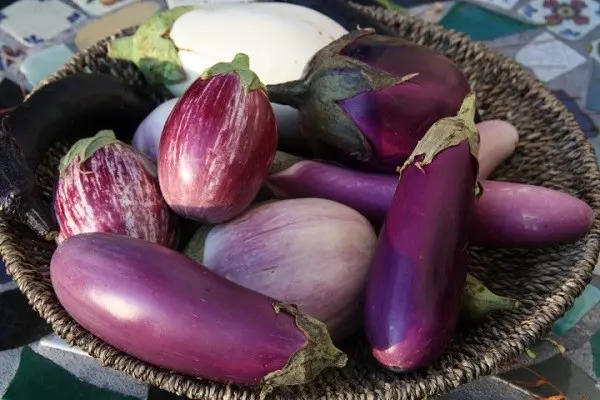
The variety belongs to early ripening – the first crop ripens in 95-105 days. The fruits are not long, but wide in diameter (the weight of each is 230-300 g), dark purple in color with a smooth glossy skin. The pulp is white, slightly greenish, bitterness is completely absent, which allows you to use vegetables for any dishes and processing. The yield is quite high – 6,5-8 kg / 1 sq. m. Well transported, easy to clean, as the stems and stalks are completely devoid of thorns.
Baikal
Mid-season (100-110 days) hybrid, characterized by an impressive size of bushes (1 m in height). Suitable for growing in any greenhouse. It is quite resistant to diseases and unpretentious in care, but for normal development it is necessary to constantly maintain humidity. The yield of the variety is 2-6 kg / 8 sq. m landing.
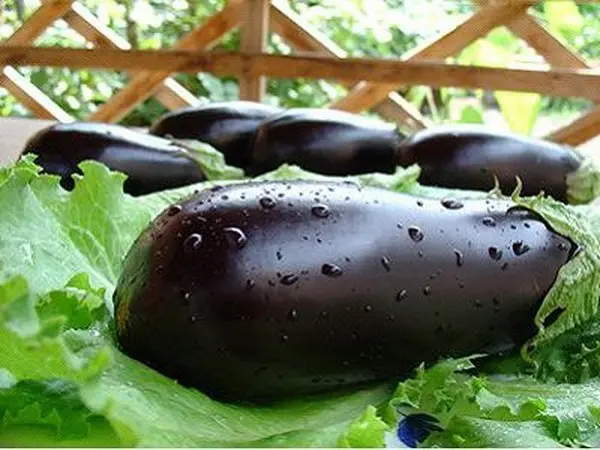
The fruits are quite large (300-350 g), long, sometimes pear-shaped or slightly curved. The color of eggplant is dark purple with a smooth and shiny surface. The flesh is greenish, dense, with a minimum number of seeds and no characteristic bitterness. The fruits are transportable, suitable for cooking any dishes and processing.
Joker
A feature of this variety is an unusual type of fruiting – carpal, when 4-7 fruits are formed from one brush and ripen at the same time. The hybrid belongs to the early ones (the fruit ripening period is 85-100 days), and is characterized by an unusually high yield – 50-70 eggplants can be immediately removed from one bush.
The fruits of this unusual variety are also very interesting: oval, slightly elongated, painted in a bright purple color. Sometimes there are instances with a darker purple color – this is possible if different eggplant hybrids are planted together. The weight of the fruit is small (80-130 g), the peel is rather thin and smooth, the flesh is white, dense, pleasant to the taste.
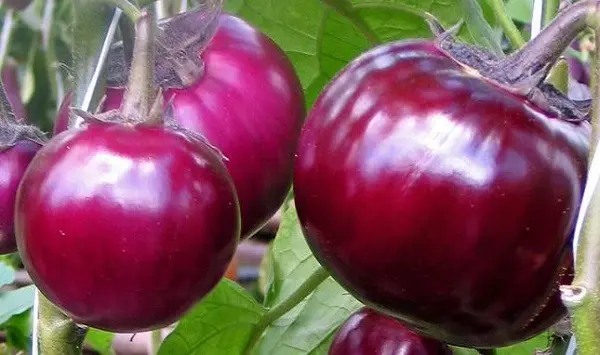
Bushes are tall – in polycarbonate greenhouses they can grow up to 1,2-1,5 m, so they need to be tied up. It will not be possible to do without tying up in a greenhouse, since the plants are very overloaded with fruits (up to 100 pieces can ripen on one bush). The culture is immune to various diseases and infections. The yield of the variety is high.
Fabina
An ultra-early hybrid intended for indoor use, however, under the right conditions, it also grows well in the garden. Fruiting occurs very early – after 70-90 days from the date of sowing. The plants are compact, open type, the height of the bushes is 45-65 cm, 7-8 fruits are formed at the same time. Eggplant yield is relatively high – 5-7 kg / 1 sq. m landing.
Fruits are medium in size (180-220 g), long (20-25 cm), cylindrical, dark purple, sometimes even black. The fruit surface is smooth and shiny. The pulp is slightly greenish, dense, seeds are completely absent in young fruits. The taste of vegetables is quite unusual – with a mushroom flavor, due to which they are often used in Caucasian cuisine.
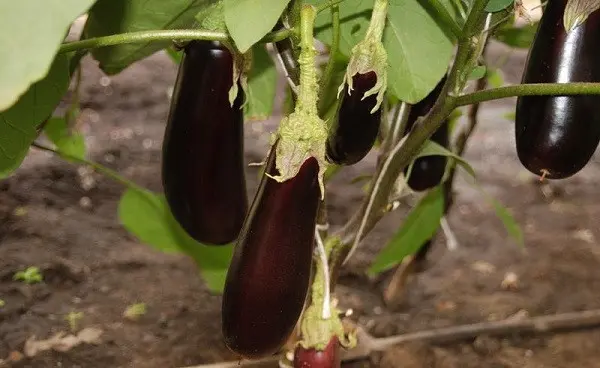
Transportability and safety of eggplants is high. The culture is resistant to pests (spider mites), diseases, especially verticillium. The purpose of the fruit is very different – from snacks and main courses to pickling, pickling and even freezing.
Black handsome man
The variety belongs to mid-season – the first harvest can be harvested only after 120-145 days from seed germination. It grows equally well and bears fruit in greenhouses and in the open ground of the southern regions. The yield of the variety is very high – 10-12 kg / 1 sq. m. The plant is disease resistant, loves moist and fertile soil.
The bushes are compact, low (60-80 cm), stems and leaves with thorns. A rare feature of this eggplant variety is the formation of an ovary in the lower part of the bush, and being in full shade, the vegetables ripen perfectly regardless of the weather and the amount of light.
Medium-sized fruits (180-250 g), have an elongated pear-shaped shape, rather wide in diameter. The color of the peel in technical ripeness is intense purple, as the vegetable ripens, it becomes purple-black. The pulp is dense, slightly greenish or yellow, delicate in taste, without bitterness. Eggplants retain their marketable appearance for a long time.
For eggplant, polycarbonate greenhouses allow you to create ideal growing conditions. They are able to maintain a constant temperature, reliably protect from winds, temperature changes and night frosts. If vegetables are provided with full-fledged watering under such conditions, then you can get an eggplant harvest that is much higher than from open ground.
Video “Eggplant”
About some features of growing eggplant is described in this video.









